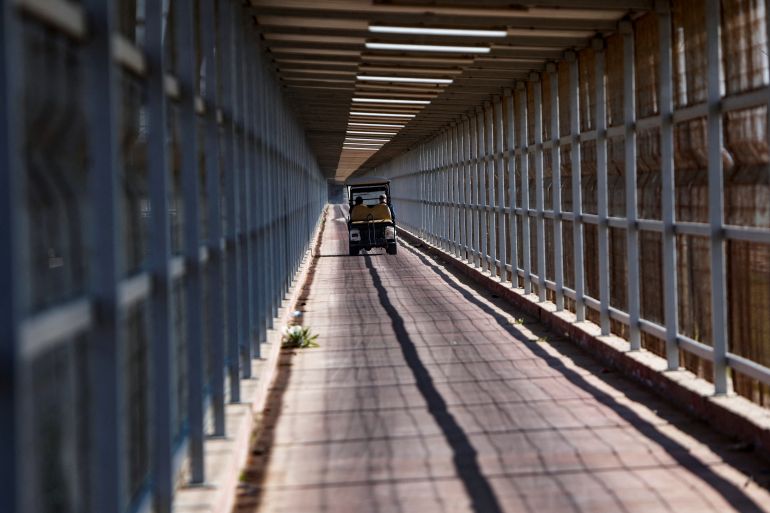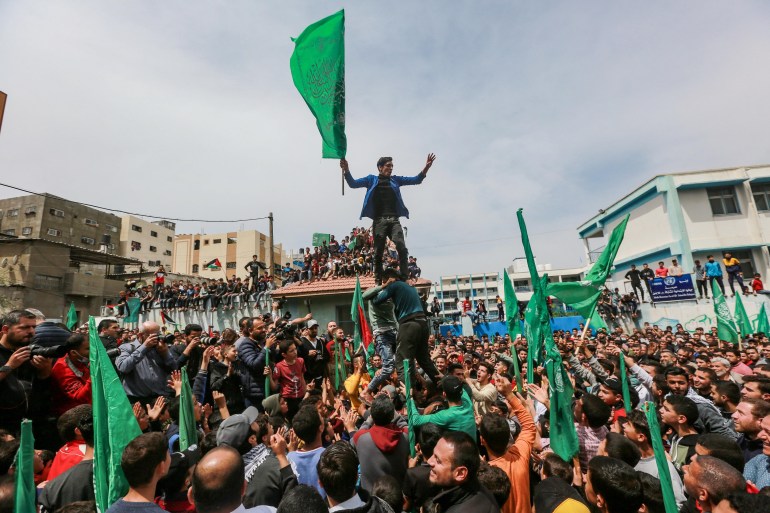Palestinians denounce Israel’s move to close Gaza crossing
Move comes after Israeli army accused Hamas of firing three rockets into Israel late on Friday.

Israel’s decision to close its only crossing for Palestinian workers coming from the Gaza Strip has been denounced as “collective punishment” of the impoverished territory’s two million residents who have lived under an Israeli-Egyptian blockade for nearly 15 years.
The move, announced on Saturday, comes after the Israeli army accused Hamas, the armed group that rules the Gaza Strip, of firing three rockets into Israel late on Friday, as tensions continue to mount during the Muslim holy month of Ramadan.
Keep reading
list of 3 itemsPalestinians in Gaza call for right of return on Land Day
Gaza protests against Israeli raids at Al-Aqsa Mosque
One hit an open field inside Israel, while another fell inside the Palestinian territory, the Israeli army said, without providing details on the third one.
Earlier this week, the Israeli army said four rockets were launched from Gaza but were intercepted by air defence systems.
“Following the rockets fired toward Israeli territory from the Gaza Strip last night, it was decided that crossings into Israel for Gazan merchants and workers through the Erez Crossing will not be permitted this upcoming Sunday,” COGAT, a unit of the defence ministry responsible for Palestinian civil affairs, said in a statement.
The Gaza workers union said the closure was “collective punishment” and would hurt the already suffering economy, where unemployment hovers around 50 percent.
It said the timing of the closure, just before the Eid al-Fitr holiday marking the end of Ramadan, would compound the pain for families struggling to make ends meet.
Sami Amassi, head of the union, said the permits themselves were meant to “exploit” the workers for political purposes, rather than improve their lives.
Hamas spokesman Hazem Wassem said the move “aims at tightening the siege and is a form of aggression that we cannot accept”.
“This will not succeed. The police of collective punishment against the Palestinians has always proven to fail,” he told The Associated Press.
Israel carried out air raids in different areas of the Gaza Strip twice last week with the Israeli military saying its fighter jets attacked military targets.
The exchange of fire took place amid heightening tension at the Al-Aqsa Mosque in occupied East Jerusalem which has been at the centre of days of violence following a series of Israeli incursions into the holy site, which began at the start of Ramadan.
At least 57 Palestinians were injured on Friday when Israeli forces raided the mosque and attacked worshippers with rubber-coated bullets, stun grenades and fired tear gas.
Tear gas was also fired after Friday prayers, hitting Palestinians worshipping at the Dome of the Rock inside the compound.
Al-Aqsa sits atop the Old City plateau of East Jerusalem, which Israel captured in a 1967 war and annexed in a move that has not been recognised internationally.
Palestinians want occupied East Jerusalem as the capital of their hoped-for future state.
Palestinians accuse Israel of restricting Muslim worship at Al-Aqsa – the third-holiest site in Islam – while not doing enough to enforce a longstanding ban on Jewish prayer at the compound. Israel denies this.
Settler incursions under police protection during the Jewish festival of Passover this past week had led to daily confrontations with Palestinians at the mosque, with many injured and arrested.
On the first day of Passover, April 15, at least 158 Palestinians were wounded and 400 others were arrested inside the compound. Dozens more were injured and arrested throughout the week.
Despite fears of matters escalating on the ground, Palestinians have said that their continued presence at Al-Aqsa is imperative.
Ramadan represents a rare opportunity for Palestinians from the occupied West Bank as they are only allowed to enter the city with a difficult-to-obtain military permit outside of the holy month.
While Passover has ended and entrance into the mosque will be restricted to Muslims during the last 10 days of Ramadan, tensions on the ground in Jerusalem and in the occupied West Bank remain high.

On Friday, thousands of Palestinians participated in a mass rally called by the Hamas movement to show solidarity in the face of continued Israeli raids in occupied Jerusalem and the Al-Aqsa Mosque.
At the demonstration in Jabalia refugee camp, in the northern Gaza Strip, protesters held banners declaring Palestinian dominion over the Al-Aqsa Mosque and chanted slogans deploring Israeli attacks against worshippers there.
Weeks of protests and raids by Israeli forces on Al-Aqsa during Ramadan last year escalated into a widespread uprising across Israel and the occupied Palestinian territories, and an 11-day assault on the besieged Gaza Strip.